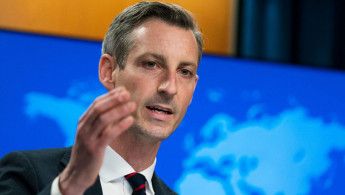US reaffirms 'commitment' to reopening consulate for Palestinians in Jerusalem as Israel government collapses
The United States has reaffirmed its "commitment" to reopening a consulate in Jerusalem for Palestinians, saying the collapse of yet another Israeli government will not impact its Israeli-Palestinian policy.
US State Department spokesman Ned Price on Tuesday told reporters that the dissolution of the coalition co-led by Naftali Bennett and Yair Lapid will not undermine Washington’s pledge to reopen a diplomatic mission for Palestinians.
The consulate in occupied East Jerusalem was closed by former President Donald Trump in 2019. Its reopening is widely seen by Palestinians and allies as an important step towards improving ties between the US and Palestine, which were severed almost entirely during the Trump presidency.
“We remain committed to reopening a consulate in Jerusalem," said Price.
"We [the Biden administration] have really re-energized the relationship between the United States and the Palestinian Authority (PA),” he added.
Price also referenced recent high-level talks between US Secretary of State Antony Blinken and Palestinian President Mahmoud Abbas.
Last month, the two senior figures had a “tough” phone call over Israeli aggression in the occupied territories, discussing the nationalist Israeli “flag march” and violence at Al-Aqsa Mosque, according to Axios.
Price also confirmed Biden's forthcoming visit to Bethlehem, where he is expected to meet leaders of the PA.
The PA has repeatedly called on the US to hasten its reopening of the Jerusalem consulate, remove the Palestine Liberation Organisation (PLO) from the US terror blacklist, and allow the reopening of its office in Washington.
The US, so far, has pursued "alternative steps" toward re-establishing ties with Palestinians, which include diplomatic restructuring so that envoys in Jerusalem report directly to State Department headquarters.
When asked about whether a comeback by Benjamin Netanyahu, former Israeli prime minister and now opposition leader, would reconfigure US Middle East policy, Price responded: "This is a strategic relationship [between Israel and the US]. It does not depend on who sits in the Oval Office; it does not depend on who sits in the prime minister’s chair."
Like his prime ministerial successors Bennett and Lapid, Netanyahu has fiercely opposed the reopening of a consulate for Palestinians in Jerusalem.
East Jerusalem was occupied and illegally annexed by Israel following the 1967 Arab-Israeli war, in a move not recognised by the United Nations, and Palestinians consider this area as the future capital of their independent state.





 Follow the Middle East's top stories in English at The New Arab on Google News
Follow the Middle East's top stories in English at The New Arab on Google News


